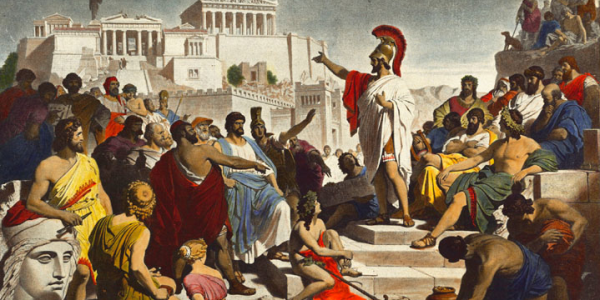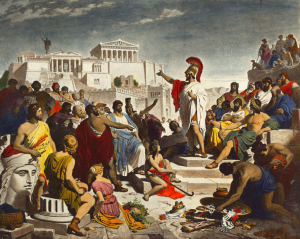
Decision and Conduct of War
10.12.18


I was in Australia recently to teach several seminars on ShinkenTaijutsu and Budo Taijutsu. On the night of my arrival in Adelaide I put my Masters Degree in National Security Strategy (National War College) to the test and led an interactive lecture on the lessons learned from the Melian dialogue during the Peloponnesian War. The discussion extended to the principals of Jus ad Bellum (just cause for war) and Jus in Bello (just proportionality of war). Many conflicts from the last 100 years were used to give real life examples of both just cause and proportionality. We finished by comparing and contrasting the current situation in the Ukraine to these just cause and just proportionality theories. Here are some excerpts from the dialogue described in The Landmark Thucydides. I’ve underlined some of the key points and provide a summary and links at the end.
______________________________________________________________________
The Melian Dialogue
Peloponnesian War, 16th Year/Summer: An Athenian expedition against Melos sends envoys to negotiate.
Excerpts taken from The Landmark Thucydides, A Comprehensive Guide to the Peloponnesian War, pages 349-357. This war lasted more than 27 years, between 427-400 BC. Thucydides was a retired soldier/historian who chronicled most of this epic war.
The Landmark, which has been translated and edited and cross referenced by numerous other authoritative sources, is a treasure trove of insights into ancient warfare, strategy, statecraft and what drove the human spirit at that time. I have provided the dialogue between the Melians and Athenians so that we might study the many lessons Thucydides provides us in this ancient text. I have underlined some of the key phrases in the text of the debate and made comments in italics between the two parties. At the end is a summary of many key points made during the debate.
Peloponnesian War, 16th Year/Summer: An Athenian expedition against Melos sends envoys to negotiate.
The Athenians made an expedition against the isle of Melos with 30 ships of their own, 6 Chian and 2 Lesbian vessels, 1600 hoplites, 300 archers from Athens and about 1500 hoplites from the allies and the islanders. The Melians are a colony of Sparta that would not submit to the Athenians like the other islanders and at first remained neutral and took no part in the struggle, but afterwards upon the Athenians using violence and plundering their territory, assumed an attitude of open hostility. Celomedes son of Lycomedes and Tisias son of Tisimachu, the generals, encamping in their territory with the above armament, before doing any harm to their land, sent envoys to negotiate. These the Melians did not bring before the people, but bade them state the object of their mission to the magistrates and the Few; upon which the Athenian envoys spoke as follows:
Athenians: “Since the negotiations are not to go on before the people, in order that we may not be able to speak straight on without interruption, and deceive the ears of the multitude by seductive arguments which would pass without refutation (for we know that this is the meaning of our being brought before the Few), what if you who sit here were to pursue a method more cautious still !! Make no set speech yourselves, but take us up at whatever you do not like, and settle that before going any farther. And first tell us if this proposition of ours suits you.”
Note only the Few and not the People are present. However, the Athenians are willing to debate frankly and openly. Who were these Few? Are they politicians or worse lawyers? Where the Melian officials worried that the people would be in favor of an alliance with Athens?
Melian Commission: “To the fairness of quietly instructing each other as you propose there is nothing to object; but your military preparations are too far advanced to agree with what you say, as we see you are come to be judges in your own cause, and that all we can reasonably expect from this negotiation is war, if we prove to have right on our side and refuse to submit, or in the contrary case, slavery.”
Because the Athenians bring their armies to the shores of Melos, the Melians believe their only recourse is war or slavery and that the debate is useless.
Athenians: ” If you have met to reason about presentiments of the future, or for anything else than to consult for the safety of your state upon the facts that you see before you, we will cease talking; otherwise we will go on.”
The Athenians assure the Melians that they are willing to debate the future of Melos.
Melians: “It is natural and excusable for men in our position to turn more ways than one both in thought and utterance. However, the question in this conference is, as you say, the safety of our country; and the discussion, if you please, can proceed in the way which you propose.”
Athenians: “For ourselves, we shall not trouble you with specious pretenses- either of how we have a right to our empire because we overthrew the Mede, or are now attacking you because of wrong that you have done us- and make a long speech which would not be believed; and in return we hope that you, instead of thinking to influence us by saying that you did not join the Spartans, although their colonists, or that you have done us no wrong, will aim at what is feasible, holding in view the real sentiments of us both; since you know as well as we do that right, as the world goes, is only in question between equals in power, while the strong do what they can and the weak suffer what they must.”
This is one of the key lessons from this text. Only equals in power can expect what is right and just. Those in a weaker position can have no expectation of justice in this early warfare. Jus ad bellum, Jus in Bello came to be much later in history when superpowers (such as the Holy Roman Empire) came to be. We have the luxury to decide if a war is just or not and what the appropriate level of force should be applied when we are the superior power. The argument can be made that as a country becomes more “civilized” or aware of its place in the world context, these countries will debate going to war. In the US, the POTUS (as Commander in Chief) has the right to defend the Nation for a limited time, with limited resources and under limited circumstances. Congress must vote and approve becoming involved in a sustainable conflict. Typically war has to meet the criteria of Jus ad Bellum. Is this a Just War? If it is deemed justified to go to war the follow on debate is a matter of proportional force. How much force is justified/necessary to achieve the goals of a just war? Just War Theory is the topic of separate lecture but here are the concepts:
Decision for War (Jus ad Bellum)
Just Cause: Only to confront a real and certain danger.
Right Authority: Even just causes cannot be served by actions taken by individuals or groups who do not constitute a sanctioned, legitimate authority, recognized as such by society and outsiders to that society.
Right Intent: A just war can only be fought with “good intentions” – to redress a wrong or “for the cause of peace.”
Last Resort: All non-violent options must be exhausted before the resort to force can be justified.
Probability of Success: A war can only be just if it is fought with a reasonable chance of success. Deaths and injury incurred in a hopeless cause are not morally justifiable.
Proportionality: The positive outcomes must outweigh the damage to be inflicted and the costs and risks to be incurred.
Conduct of War (Jus in Bello)
Proportionality: The level of violence must be proportional to the injury suffered. Excessive force—above what is necessary to attain the limited objective of righting the wrong—is prohibited.
Discrimination: Civilians are never legitimate targets, and every effort must be made to hold them immune. The weapons used in war must discriminate between combatants and non-combatants. Harm to civilians is justifiable only if they are the unavoidable victims of an attack on a military target.
Melians: “As we think, at any rate, it is expedient- we speak as we are obliged, since you enjoin us to let right alone and talk only of interest- that you should not destroy what is our common protection, namely, the privilege of being allowed in danger to invoke what is fair and right, and even to profit by arguments not strictly valid if they can be persuasive. And you are as much interested in this as any, as your fall would be a signal of the heaviest vengeance and an example for the world to meditate upon.”
Melians point out how useful moral arguments could be to Athens if her empire falls.
Athenians: “The end of our empire, if end it should, does not frighten us: a rival empire like Sparta, even if Sparta was our real antagonist, is not so terrible to the vanquished as subjects who by themselves attack and overpower their rulers. This however, is a risk that we care content to take. We will now proceed to show you that we have come here in the interest of our empire, and that we shall say what we are now going to say, for the preservation of your country; as we would desire to exercise that empire over you without trouble, and see you preserved for the good of us both.”
The Athenians state something very curious. They are not frightened so much to fall to a rival such as Sparta, but to be attacked from within by their subjects who overpower their rulers. This speaks of the internal unrest of these times where there are so many slaves and former conquered countries within forced alliances. Athens’ power as well as Sparta’s was in constant peril at any given time due to these forced alliances and the threat of mob rule.
Melians: “And how, pray, could it turn out as good for us to serve as for you to rule?”
Athenians: “Because you would have the advantage of submitting before suffering the worst, and we should gain by not destroying you.”
Melians: “So you would not consent to our being neutral, friends instead of enemies, but allies of neither side.”
Athenians: “No, for your hostility cannot so much hurt us as your friendship will be an argument to our subjects of our weakness, and your enmity of our power.”
No neutrals, friendship argues to our weakness.
Melians: “Is that your subjects’ idea of equity, to put those who have nothing to do with you in the same category with peoples that are most of them you own colonists, and some conquered rebels?”
Athenians: “As far as right goes they think one has as much of it as the other, and that if any maintain their independence it is because they are strong, and that if we do not molest them it is because we are afraid; so that besides extending our empire we should gain in security by your subjection; the fact that you are islanders and weaker than others rendering it all the more important that you should not succeed in thwarting the masters of the sea.”
The Athenians were, up to this point the Masters of the Sea and Sparta was master of land warfare. For most of the war, Sparta stuck to the land and Athens keep the seas. There is a lot about maneuver warfare we can discuss if time permits. Athens must subdue Melos to keep respect of its subjects that they are not worried in the least about Sparta retaliating.
Melians: “But do you consider that there is not security in the policy which we indicate? For here again if you debar us from talking about justice and invite us to obey your interest, we also must explain ours, and try to persuade you, if the two happen to coincide. How can you avoid making enemies of all existing neutrals who shall look at our case and conclude from it that one day or another you will attack them? And what is this but to make greater the enemies that you have already, and to force others to become so who would otherwise have never though of it?
The Melians argue that Athens’ policy will only create more enemies for her. Make enemies of other neutrals.
Athenians: “Why, the fact is that mainlanders generally give us but little alarm, the liberty which they enjoy will long prevent their taking precautions against us; it is rather islanders like yourselves, outside our empire, and subjects smarting under the yoke, who would be the most likely to take a rash step and lead themselves and us into obvious danger.”
Melians: “Well then, if you risk so much to retain your empire, and your subjects to get rid of it, it were surely great baseness and cowardice in us who are still free not to try everything that can be tried, before submitting to your yoke.”
Athenians: “Not if you are well advised, the contest not being an equal one, with honor as the prize and shame as the penalty, but a question of self-preservation and of not resisting those who are far stronger than you are.”
This is not about honor or shame; this is about self-preservation. Athenians, in this instance are far the stronger of the two. The Melians are arguing from a position of ego, believing they are right and therefore the Athenians should let them be neutral. The Athenians are arguing from a position of strength and believe if they let the Melians remain neutral, other colonies and satellite states will break their alliances with Greece and declare themselves neutral as well.
Melians: “But we know that the fortune of war is sometimes more impartial than the disproportion of numbers might lead one to suppose; to submit is to give ourselves over to despair, while action still preserves for us a hope that we may stand erect.”
Athenians: “ Hope, danger’s comforter, may be indulged in by those who have abundant resources, if not without loss, at all events without ruin; but its nature is to be extravagant, and those who go so far as to stake their all upon the venture see it in its true colors only when they are ruined; but so long as the discovery would enable them to guard against it, it is never found wanting. Let not this be the case with you, who are weak and hang on a single turn of the scale; nor be like the vulgar, who, abandoning such security as human means may still afford, when visible hopes fail them in extremity, turn to the invisible, to prophecies and oracles, and other such inventions that delude men with hopes to their destruction.”
The nature of hope is to be extravagant is a great quote. Hope springs eternal. Hanging on hope and a prayer. We have many expressions about hope that are derived from this thought. We still have a chance as long as we have hope. The Athenians are saying here that hope is only for the strong. You are deluding yourselves if you hope to win because you are the weak in this situation. Give up hope. Fear, honor, interest.
Melians: “You may be sure that we are as well aware as you of the difficulty of contending against your power and fortune, unless the terms be equal. But we trust that the gods may grant us fortune as good as yours, since we are just men fighting against unjust, and that what we want in power will be made up by the alliance of the Spartans, who are bound, if not for very shame, to come to the aid of their kindred. Our confidence, therefore, after all is not so utterly irrational.”
So it comes out that Melos believes Sparta will come to their rescue due to their neutral, but friendly alliance. They will be sorely disappointed as it turns out.
Athenians: “When you speak of the favor of the gods, we may fairly hope for that as yourselves… Of the gods we believe, and of men we know, that by a necessary law of their nature they rule wherever they can…
The Athenians also hope for the gods’ favor, since they only do what is natural to both gods and men: rule where they can. It is foolish to believe that the Spartans, who are moral hypocrites when the interests of others are concerned, will aid Melos because of sentiment or shame.
Athenians: ”…While justice and honor cannot be followed without danger; and danger the Spartans generally court as little as possible.”
Athenians: ”…Yes, but what an intending ally trusts to is not the goodwill of those who ask his aid, but a decided superiority of power for action; and the Spartans look to this even more than others. At least, such is their distrust of their home resources that it is only with numerous allies that they attack a neighbor; not is it likely that while we are masters of the sea they will cross over to an island?”
During this period in Sparta the Helots were uprising. Helots were the lowest caste of people in Sparta. Farmers mostly. They had no rights in a warrior society. Most of their natural resources were reference to these Helots and what they produced for the state (food). Hoplites were their standard army of soldiers. Many of these were former slaves or mercenaries also with little rights, but much more than the Helots. Whenever Sparta sent off a large force of warriors and Hoplites to war, they risked losing their own cities to the Helot and slave uprisings. It is being pointed out again that the Athenians owned the seas and therefore it is unlikely the Spartans would attempt a rescue, even if their cities were in a calm state.
Melians: “But they would have others to send. The Cretan Sea is a wide one, and it is more difficult for those who command it to intercept others, than for those who wish to elude them to do so safely. And should the Spartans miscarry in this, they would fall upon your land, and upon those left of your allies… instead of places which are not yours, you will have to fight for your own country and your own confederacy.”
Sparta will attack Athens.
Athenians: “Some diversion of the kind you speak of you may one day experience, only to learn, as others have done, that the Athenians never once yet withdrew from a siege for fear of any. But we are struck by the fact, that after saying you would consult for the safety of your country, in all this discussion you have mentioned nothing, which men might trust in and think to be saved by. Your strongest arguments depend upon hope and the future, and your actual resources are too scanty, as compared with those arrayed against you, for you to come out victorious. You will therefore show great blindness of judgment, unless after allowing us to retire, you can find some counsel more prudent than this… You will not think it dishonorable to submit to the greatest city in Hellas, when it makes you the moderate offer of becoming its tributary ally, without ceasing to enjoy the country that belongs to you; nor when you have the choice given you between war and security, will you be so blinded as to choose the worse. And it is certain that those who do not yield to their equals, who keep terms with their superiors, and are moderate toward their inferiors, on the whole succeed best. Think over the matter, therefore, after our withdrawal, and reflect once and again that it is for your country that you are consulting, that you have not more than one, and that upon this one deliberation depends its prosperity or ruin.”
The Athenians lay out the argument one last time and entreat the Melians to become their ally. To refuse will be their ruin.
Melians: “Our resolution, Athenians, is the same as it was at first. We will not in a moment deprive of freedom a city that has been inhabited these seven hundred years; but we put our trust in the fortune by which the gods have preserved it until now, and in the help of men, that is, of the Spartans; and so we will try and save ourselves. Meanwhile we invite you to allow us to be friends to you and foes to neither party, and to retire from our country after making such treaty as shall seem fit to us both.”
The Melians restate their same arguments. They are on the side of right. The gods will protect them. The Spartans will come to their aid.
Both sides withdraw. The Athenians leave a small force behind to lay siege to Melos. They build a wall blocking the Melians’ access to the seaport. Melians attack the line several times over the next few months to get needed supplies. Athenians return with a larger force in the winter under the command of Philocrates and the siege was now pressed vigorously. After some treachery from within Melos, they surrender. The men are executed; the women and children enslaved and sold off. Athens sends out five hundred colonists to settle Melos themselves. Sparta never does come to rescue Melos.
Summary of key points and lessons from this passage are many. Here are but a few of them:
The debate was with the Melian Few (politicians) and not the people. The People may not have been so altruistic in the final decision to not accept alliance with the Athenians.
Melians believe they are in the right, that the gods are on their side and that remaining neutral is not a threat to Athens. They also feel the Spartans will come to their rescue as their neutral ally. Their position is one of hope, ego and altruism.
Athenians also believe they are right and because they are the more powerful, they can do as they want while the weak must suffer what they must. This is the right of the superior power. They also believe, since they are the superiors, that giving into Melos, allowing them to be neutral, will weaken their position with their own allies. Athens gained much more by either co-opting Melos to be their ally or making them an example.
Melians misunderstood their relationship with the Spartans. They did not see that there was no way Sparta would launch an invasion to Melos to protect them from the Athenians. Not only were the Spartans unable to do this (Athenians owned the seas), they would have been disinclined to take such risk (hoplite rebellions) for a mere neutral party who added no real value to Sparta power.
Gods and men are the same. We rule where we can. It is a necessary law of nature.
There are some interesting nuances to be learned about alliances during this time period. How effective where they?
Fear, honor, interest are 3 key motivators for war. How do these motivators stand up to Jus ad Bellum, Jus in Bello?
http://en.wikipedia.org/wiki/Melian_dialogue




